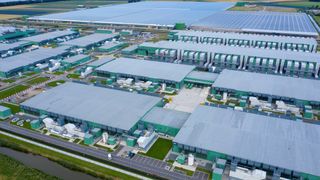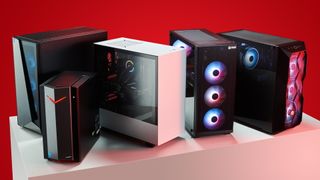Microsoft's data centers of the future could be nuclear powered
Now that's a power up!

The humble data center is not so humble. According to the International Atomic Energy Agency, data centers and data transmission networks consume between 2-3% of global power consumption, and as global internet traffic grows, and demand for things like AI explodes, 3% is a number that will surely increase in the years ahead.
Microsoft knows a thing or two about big data, and I shudder to think what its monthly power bill looks like. Heck, I'd be shocked at its hourly power bills. How do you minimize the cost of power, and do it sustainably? The answer might be nuclear. Specifically, small modular reactors (SMR).
Microsoft is certainly giving it some serious thought as it's looking to hire a "Principal Program Manager Nuclear Technology" (reported by DCD's Sebastian Moss). The job description calls for someone "who will be responsible for maturing and implementing a global Small Modular Reactor (SMR) and microreactor energy strategy."
According to the IAEA, SMRs are small nuclear reactors that can be prefabricated, have a small footprint, and can be scaled to match increased energy demand. In some cases, it may be easier and more cost effective to power a site with SMRs, instead of building costly grid infrastructure.
But even the mention of the word nuclear sends shudders down spines. It's a political hand grenade, and the public's awareness of things like Chernobyl, Fukushima and years of being exposed to dystopian wastelands in movies and TV shows makes it a difficult thing to gain support for. But if wind, solar or hydro-electric schemes are not viable in a given location, it's at least worth considering ahead of traditional fossil fueling.

Best gaming PC: The top pre-built machines.
Best gaming laptop: Great devices for mobile gaming.
The International Atomic Energy Agency believes commercial SMRs are years away from widespread deployment, though it says there are 80 commercial SMR designs in development. Questions over their economic competitiveness and comparisons with other forms of energy generation have yet to be answered though.
Microsoft might be serious about adopting SMRs, but it's more likely to be simply evaluating them in the short term. Big companies will all have to take steps to reduce their carbon footprints sooner or later, and nuclear is one possible answer to a very economically, socially, and politically complicated problem.
The biggest gaming news, reviews and hardware deals
Keep up to date with the most important stories and the best deals, as picked by the PC Gamer team.
If Microsoft deploys small modular reactors in the years ahead, where will it put them? A typical data center isn't out in the wilds, but close to civilization because of worker proximity and the people who use and generate data. Would you be happy with a nuclear reactor a block or two away from your dogs or cats or kids? That alone might be a major stumbling block to SMR adoption. Even if carbon emissions get slashed, years of built-up nuclear fears will not be dissuaded easily.
Nevertheless, intelligent, fact-based arguments for and against are worth having.

Chris' gaming experiences go back to the mid-nineties when he conned his parents into buying an 'educational PC' that was conveniently overpowered to play Doom and Tie Fighter. He developed a love of extreme overclocking that destroyed his savings despite the cheaper hardware on offer via his job at a PC store. To afford more LN2 he began moonlighting as a reviewer for VR-Zone before jumping the fence to work for MSI Australia. Since then, he's gone back to journalism, enthusiastically reviewing the latest and greatest components for PC & Tech Authority, PC Powerplay and currently Australian Personal Computer magazine and PC Gamer. Chris still puts far too many hours into Borderlands 3, always striving to become a more efficient killer.
Most Popular





